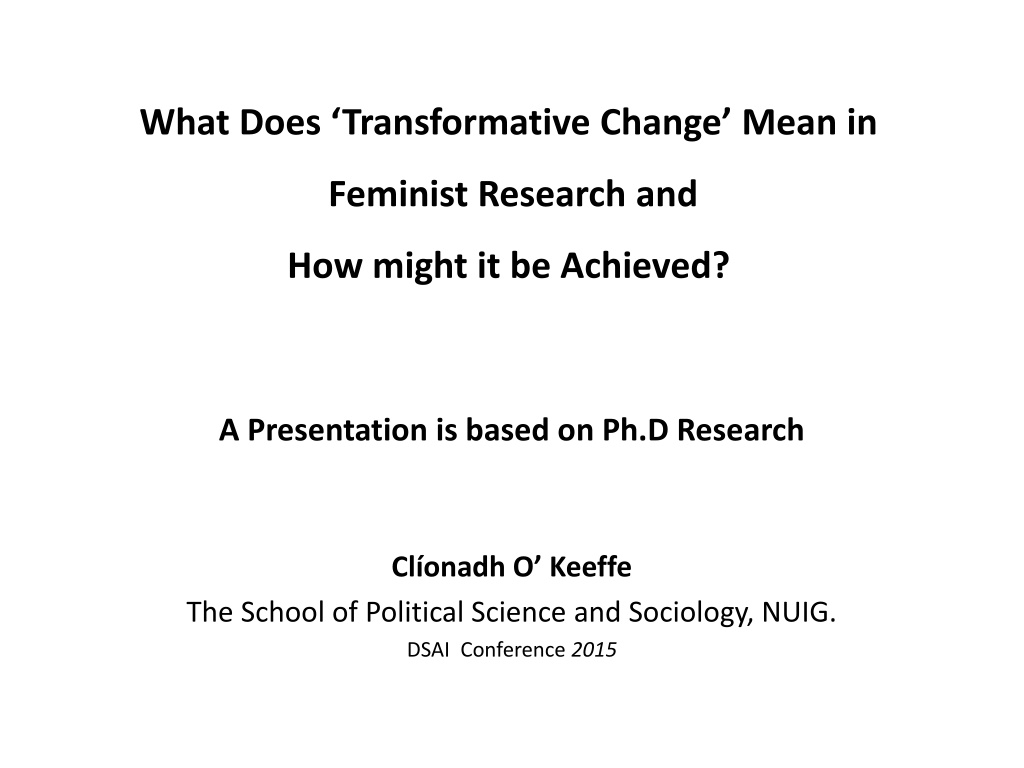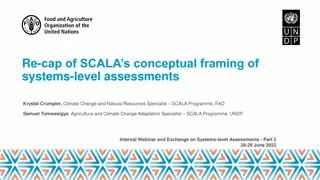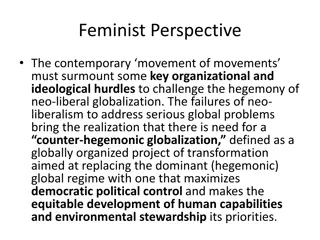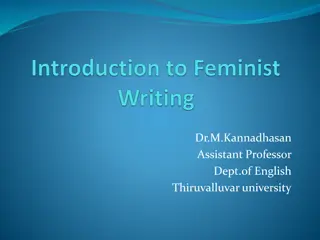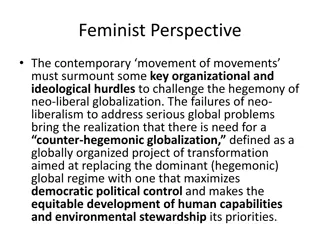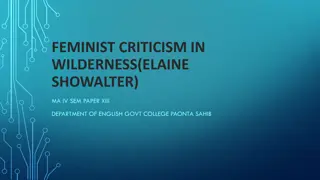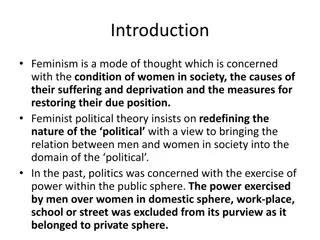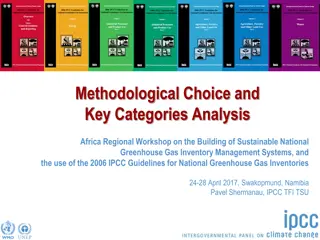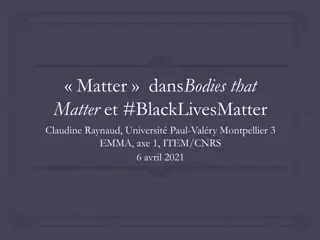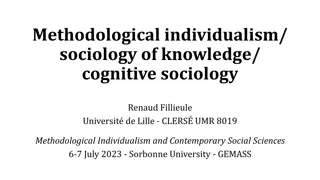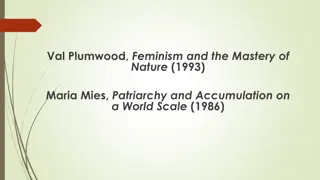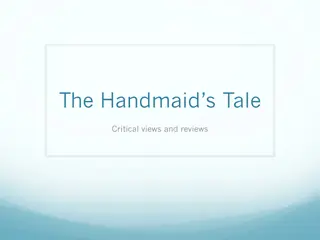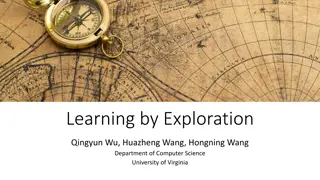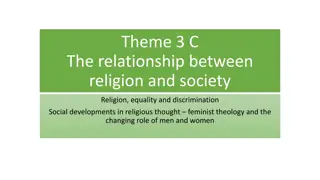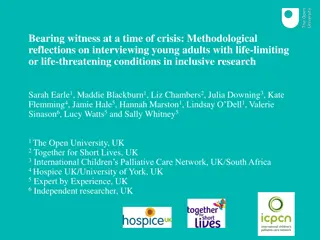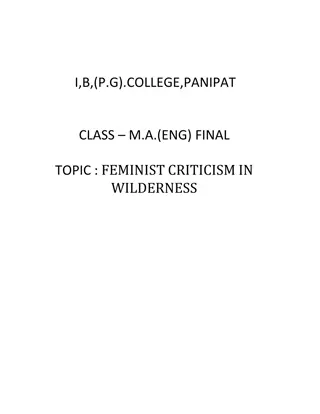Understanding Transformative Change in Feminist Research: A Critique and Methodological Exploration
Post-2015 Development Agenda focuses on achieving lasting change in women’s power and choices through gender equality efforts. This presentation discusses the transformative aspects of feminist research in analyzing gender relations, poverty, and violence in Timor-Leste. Critiques on gender mainstreaming, transformative methodologies, and the significance of addressing power dynamics in promoting gender equality post-conflict are highlighted.
Download Presentation

Please find below an Image/Link to download the presentation.
The content on the website is provided AS IS for your information and personal use only. It may not be sold, licensed, or shared on other websites without obtaining consent from the author. Download presentation by click this link. If you encounter any issues during the download, it is possible that the publisher has removed the file from their server.
E N D
Presentation Transcript
What Does Transformative Change Mean in Feminist Research and How might it be Achieved? A Presentation is based on Ph.D Research Cl onadh O Keeffe The School of Political Science and Sociology, NUIG. DSAI Conference 2015
GENDER EQUALITY AND THE POST 2015 AGENDA Post 2015 Development Agenda has the potential to bring about lasting change in the power and choices women We know that the concept of gender equality informing the targets now moved beyond a focus on the public sphere and now includes the household and the community. Critically the gender goal and its targets consider a range of important factors that shape women's daily lives and their ability to realise their rights. These include: the conditions and type of work in paid employment the burden of unpaid caring labour, the impact of violence and conflict and whether women have control over their own resources and incomes.
Presentation Focus and Overview Transformative' aspect of the research questions and the methodology used in the analysis of gender relations and women's experiences of gender, poverty and violence in post independent Timor-Leste. Focus: Presentation Overview i) Critiquing Gender Mainstreaming ii) A Transformative Methodology iii) Theorising for Transformation: Connell's Theory of Gender and Power
PROMOTING GENDER EQUALITY IN POST CONFLICT CONTEXTS Global strategies such as gender mainstreaming have been unable to successfully address gender inequality; Failure of to recognise and address gender and power dynamics embedded within unequal social and economic structures that give rise to women's everyday hardships; Understanding what a gender actually means has to be clarified if development and peacebuilding interventions are to successfully implement 'transformative' gender mainstreaming policies (True, 2013).
Gender Mainstreaming A Transformative Strategy? Empirically: Unable to challenge structures and practices that reproduce gender inequality. Theoretical deficits: lack of understanding of gender processes leading to gender inequality, context and specifically
Research Questions What are the various dimensions of women's experiences of structural inequality? How are gender, poverty and violence interacting in ways that shape the lives of women and reproduce gender inequality? How might post-conflict dynamics be breaking up or exacerbating this mutually constitutive relationship?
Research Methodology and Methods Qualitative, Feminist Standpoint: Intersectional approach - FGD and Unstructured interviews Four villages: two urban and two rural Grounded Approach: focus on the private domain. Iterative theorising: thematic analysis is followed by theoretical analysis 3 themes from within the data namely: Gendered Poverty and Standards of Living (motherhood) Gender-based Violence in the Family (Marriage) Gendered Politics in the village council
Gender Analysis Theorising Gender, Poverty and Violence Connell and Beyond Connell s Theory of Gender and Power: Understanding the meaning of gender in post-conflict context; Labour, Power, Cathexis Substantive theories GBV: substantive theory of violence in post-conflict context Poverty: Multiple dimensions of poverty: Chant and Kabeer, Lynch Conflict dimension: The back-lash: Being sensitive to the post-conflict context: Militarised and violent masculinities, maternal femininities
Conclusion What does transformative change mean and how might it be achieved? Gender relations: unpacking gender and poverty and violence (back to the research question); What have the women s told me: The complex dynamics and role of power and norms in their everyday lives;
